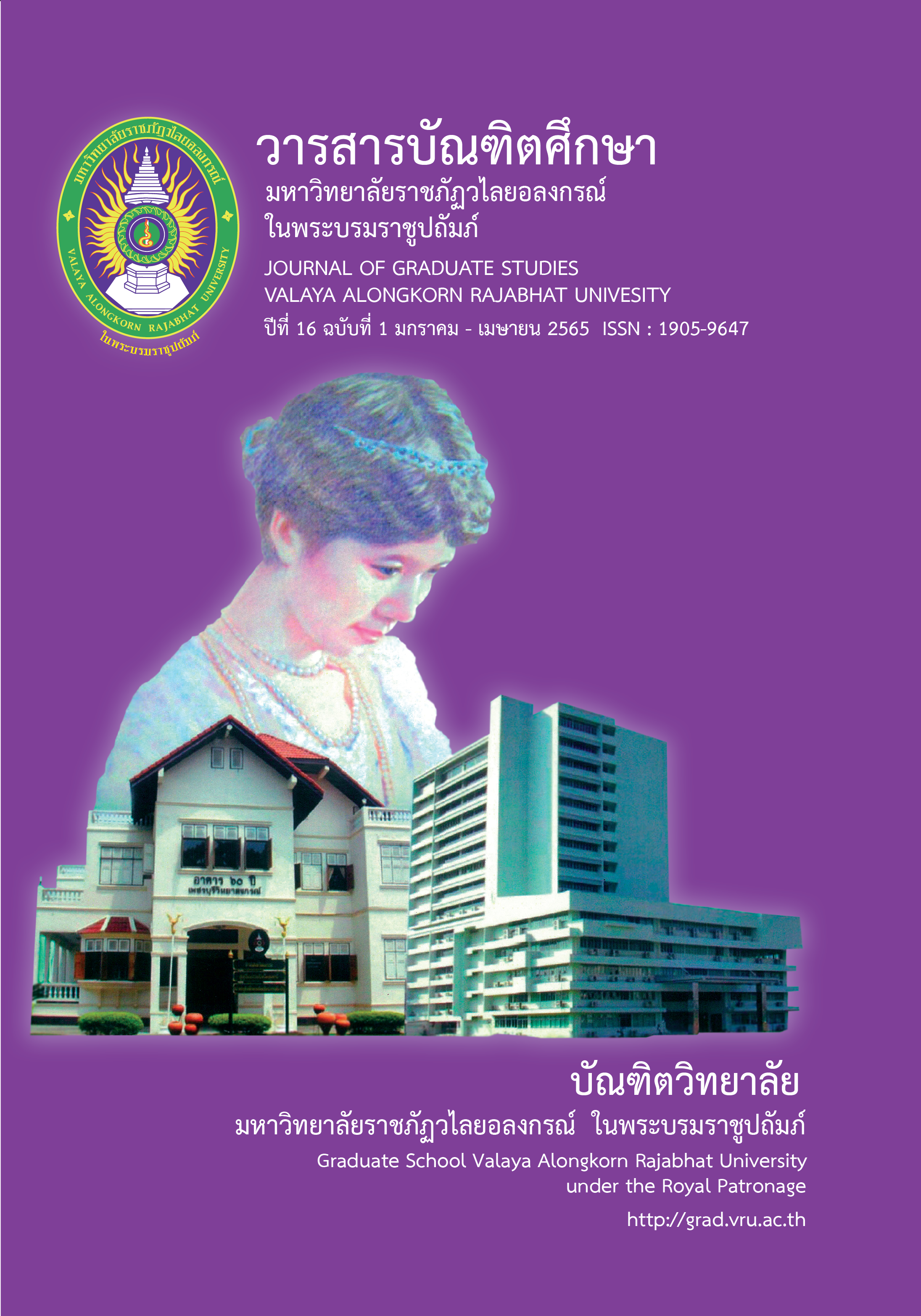EFFECT OF HERBAL LEARNING ACTIVITIES USING COMMUNITY FOREST-BASED LEARNING OF THAI TRADITIONAL MEDICINE STUDENTS, PHETCHABURI RAJABHAT UNIVERSITY
Main Article Content
Abstract
This quasi-experimental research was aimed to: 1) compare the herbal learning achievement, and 2) study the opinions of 2nd and 3rd year students on herbal learning activities using community forest-based learning. The sample were 41 Thai Traditional Medicine students, Phetchaburi Rajabhat University and were selected by purposive sampling. Samples attended 4 sessions and each session took 3-6 hours. The sessions covered the promotion of knowledge about herb. The methods used were lecture by folk philosopher, group activities, teamwork, searching for information using technology, dialogue, group discussion, and self-study. The research instruments were questionnaires and tests with an alpha coefficient between 0.81 and 0.85. Data analysis was done by computing statistics including percentage, arithmetic mean, Paired samples t-test, and Wilcoxon signed rank test.
The results showed that: 1) after activities samples had a higher average score of knowledge about herb (6.50±0.65 & 8.81±0.92) than before activities (5.29±0.91 & 5.74±1.93) with statistical significance (p-value<0.05). And 2) samples had the mean scores of opinions towards activities at the high level and the highest level. These results have shown that herbal learning activities using community forest-based learning can be effective for enhancing knowledge about herbs of samples. Therefore, other educational institution which have similar context should be able to integrate these activities with the bachelor of Thai Traditional Medicine Program.
Article Details

This work is licensed under a Creative Commons Attribution-NonCommercial-NoDerivatives 4.0 International License.
บทความทุกเรื่องได้รับการตรวจความถูกต้องทางวิชาการโดยผู้ทรงคุณวุฒิ ทรรศนะและข้อคิดเห็นในบทความ Journal of Global of Perspectives in Humanities and Social Sciences (J-GPHSS) มิใช่เป็นทรรศนะและความคิดของผู้จัดทำจึงมิใช่ความรับผิดชอบของบัณฑิตวิทยาลัย มหาวิทยาลัยราชภัฏวไลยอลงกรณ์ ในพระบรมราชูปถัมภ์ กองบรรณาธิการไม่สงวนสิทธิ์การคัดลอก แต่ให้อ้างอิงแหล่งที่มา
References
Boonchai, P. and Chomhongphiphat, P. (2015). Kar wicạy læa phạtʹhnakar cạd krabwnkar relyn ru bæb burn a kar doy chı̂ h̄æl̀ng relyn ru nı thxngt̄hìn pen than s̄ảh̄rạb s̄t̄han s̄ụks̄ʹa nı chumchn rxb h̄nxng h̄ar cạngh̄wạd s̄klnkhr [Research and development of integrated learning process based on local learning resources for educational institutions in Nonghancommunity area, Sakon Nakhon]. Journal of Graduate Research, 12(58), 185-194.
Chulrat, P. (2018). Kar cạdkar relyn ru s̄ảh̄rạb p̄hu relyn nı prathesthịy 4.0 [Learning management for learners in Thailand 4.0]. Silpakorn University Veridian E-Journal, 11(2), 2363-2380.
Janjamsai, M. (2015). Khorngkar t̄hxd chud pras̄bkarn kar cạdkar relyn ru doy chı̂ chumchn pen than: Krni sụks̄ʹa ka rbu rna kar kar cạdkar relyn ru wicha xxkbæb s̄t̄hapạtykrrm kạb kar phạtʹhna thi xyu xasạy k̄hxng p̄hu mi ray dị̂ n̂xy (khorngkar b̂an mạ̀nkhng chumchn phraram 9 b̀x 3) [Experiential modeling of community based learning case study of integration of architectural design learning and low-income housing development (Baan Munkong: Project at Rama 9 Suma 9 Sump 3 Community]. Phranakhon Rajabhat Research Journal, 10(1), 143-156.
Katudom, P. (2011). P̄hl k̄hxng porkærm kar s̄̀ngs̄erim phvtikrrm s̄uk̄hp̣haph k̄hxng p̄hus̄ungxayu nı k̄het thes̄bal tảbl bang ka ca xảp̣hex meụ̄xng cạngh̄wạd cạnthburl [The effect of a health behavior promoting program for the elderly in Bangkaja Subdistrict Municipality, Muang District, Chanthaburi Province]. Journal of Phrapokklao Nursing College, 22(2), 61-70.
Kittichatchaowalit, K. (2016). khwam khidh̄en k̄hxng nạksụks̄ʹa radạb bạnthit sụks̄ʹa t̀x h̄lạks̄utr kar s̄xn p̣has̄ʹa xạngkvs̄ʹ pheụ̄̀x wichakar læa ngan xachiph [Opinions of graduates towards teaching English for academic and occupational purposes program]. Journal of Humanities and Social Sciences, Rajapruk University, 2(1), 47-55.
Kongma, S. (2015). Kar sụks̄ʹa sạkyp̣haph kar phæthy̒ p̄hæn thịy nı h̄n̂athl pen thang leụ̄xk k̄hxng kar rạks̄ʹa rokh thl ml k̄hx cảkạd [The study of the potential of Thai traditional medicine in acting as an alternative treatment for diseases with limitations]. Nakhon Sawan: National and international conference interdisciplinary research for local development sustainability.
Lovett, H. T. (2002). The Effect of Violating the Assumption of Equal Item Means in Estimation the Livingstone Coefficient. Education and Psychological Measurement, 38(1978), 239-251.
Office of the Higher Education Commission. (2016). S̄kx phạtʹhna nạkrelyn s̄u prathesthịy 4.0 [Office of the Higher Education Commission developed students to Thailand 4.0]. Higher Education Journal, 43(462), 11-13.
Parno, P. (2020). Xeks̄ar prakxb khorngkar kar s̄r̂ang nwạt kr cak kar relyn ru s̄munphịr n h̄̂xngrelyn thrrmchati h̄muban pòng s̄lxd [The Project Summary Report: Creating the Innovations of herbal hub from the nature classroom at Ban Pongsalot village]. Phetchaburi: Phetchaburi Rajabhat University.
Phetchaburi Rajabhat University. (2020). H̄lạks̄utr kar phæthy̒ p̄hæn thịy banthit (c̄hbạb prạbprung ph.s. 2563) [Bachelor of Thai Traditional Medicine Program (Revised edition 2020)]. Phetchaburi: Phetchaburi Rajabhat University.
Rittikup, W. (2018). Kar cạdkar relyn ru doy chı̂ chumchn pen than: Klyuthth̒ kar cạdkar relyn ru thl ml pras̄iththip̣haph k̄hxng khru nı stwrrs̄ʹ thl 21 [Community-based learning management: effective learning management strategies of teachers in the 21st century]. Graduate School Journal Chiang Rai Rajabhat University, 11(3), 179-191.
Ruamjit, S. (2013). khwam khidh̄en k̄hxng nạksụks̄ʹa t̀x kar k̄hêa r̀wm kickrrm nạksụks̄ʹa mh̄awithyalạy rachp̣hạt̩ rảphị phrrni [Students opinions towards the activity participation in Rambhai Barni Rajabhat University]. Retrieved from http://newtdc.thailis.or.th/docview.aspx?tdcid=15383
Sisaart, B. (2002). kānwičhai bư̄angton [Basic research]. 7th ed. Bangkok: Suweeriyasan Company Limited.
Suwansin, N. (2010). Phrrn phvks̄ʹchati nı p̀a pòng s̄lxd cạngh̄wạd phechrburl [Flora of vegetation in the Pong Croton forest Phetchaburi Province]. Bangkok: Chamchuri Product.
Warapongsatorn, T. (1997). H̄lạkkar wicạy thang s̄atharns̄uk̄h sas̄tr̒ [Principles of Health Science Research]. Bangkok: Chulalongkorn University.


